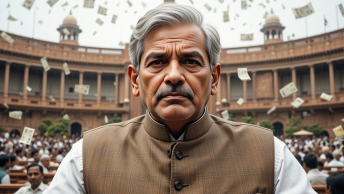The order of a full bench of the Karnataka High Court in the MLA defection case, dated February 14, 2011, which runs into 192 pages, is available here. The resounding proposition of the court’s decision in this case is that when an independent member of a legislative assembly becomes a part of the ministry in a government dominated by a single party, he loses his independent character and becomes liable to disqualification on the ground of defection.
Five independent members of the Karnataka Legislative Assembly who had declared their support to the BJP government, and were inducted into the Council of Ministers, were disqualified by the Speaker of the Assembly under Paragraph 2(2) of the Tenth Schedule to the constitution, factually following their representation to the Governor that they withdrew their support to the government.
Paragraph 2(2) of the Tenth Schedule disqualifies an independent member of a house/assembly who joins any political party after election on the ground of defection: “2(2) : An elected member of a House who has been elected as such otherwise than as a candidate set up by any political party shall be disqualified for being a member of the House if he joins any political party after such election.”
On page 76, the court states the object of Paragraph 2(2): “While electing a person as an independent member of Legislature, the majority of the voters of the constituency would reject the candidates from the political parties contesting from such constituency. As such, it is expected and it is incumbent on the elected independent member to retain his independent character without joining any political party and without imbibing or following the policies or ideas of any political party. The electorate while choosing to vote for the independent would be aware that if elected, their representative would not be a part of the Government which in any event will be formed by one or the other political party.” (emphasis supplied)
The question was whether the five petitioners in this case had “joined” the BJP. The court held that they had, for the following reasons:
(1) Becoming Ministers:
Citing Jagjit Singh’s case [(2006) 11 SCC 1], it was held that giving “outside support” to a government does not constitute “joining” a political party. However, joining the ministry in a government formed by the single largest political party does not constitute mere “outside support”:
“The general perception of understanding the act of outside support means, supporting the Government from outside without being a part of the Government but adding to the number to have majority in the Assembly, meaning thereby if an elected representative joins the Ministry, he is not giving the outside support to the Government, but is a part of the Government.” (emphasis supplied)
The court held that while electing an independent candidate, the electorate would be aware that their representative would not be a part of the government. Accordingly, by becoming a minister and thereby a part of the government, the representative becomes liable to disqualification. To address the concern that this holding may have far reaching implications for coalition governments, the court chose to distinguish between a coalition government and a government formed by the “single largest party”:
“In this regard, the contention of Sri Ravivarma Kumar, appearing on behalf of the petitioners, also needs to be considered. He contended that in case the view of the Speaker that the conduct of joining the Ministry amounts to joining the political party is accepted, then, there would be far reaching consequences on the concept of coalition Government. Such apprehension cannot be accepted since in the instant case, it cannot be considered as a coalition Government. The coalition Government is different from the Government formed by a single political party. Coalition Government is the Government by a coalition of political parties formed when political parties unite to secure majority in the House over the other groups. In the coalition Government, all the political parties which form a coalition will retain their independent political character as a heterogeneous combination and they will stick to their own ideologies. One political party of a coalition Government will not impose its ideology on other parties. However, there would be common understanding or common minimum programme to run the Government. No member of such political party which is a part of the coalition will be able to take independent decisions to either join or withdraw from the Ministry, but would be the collective decision without surrendering itself to the other political party which also results in the stability of such Government. Coalition Governments are formed in order to avoid repeated elections or elections at irregular intervals and basically they are formed in the interest of the State and not for individual benefit. But here is a case where the Government is formed by a single largest political party to which the independent members have supported unconditionally and have joined the Ministry.” [paragraph 48] (emphasis supplied)
Does this holding discredit the resolve of independent members generally, by assuming that they will not “retain their independent…character” or “stick to their own ideologies” when they become ministers? Further, does this paragraph seem to imply that in a coalition government, an independent member who joins the ministry may not be liable to disqualification on the ground of defection?
(2) Attending Party Meetings Otherwise than as Independent Members:
The petitioners in some instances signed the register of party meetings without distinguishing themselves as distinct from other party members: “Since the petitioners have attended and signed the Register relating to BJP Legislature party meetings, it can be inferred that they have treated themselves as members of the House belonging to BJP as a continuing act after joining the Ministry.” [page 171]
(3) Receiving the Whip sent by the Chief Whip of a Party:
“If really the petitioners were not the members of the Legislature party of BJP, they would not have received the `whip’ sent by the Chief Whip of that party. There is no reason as to why the petitioners should receive such a direction issued by the Chief Whip of BJP if they had retained their independent character and identity, more particularly, when they were described as the members of ruling party.” [p. 174]
(4) Participating in Rallies:
The petitioners also participated in rallies conducted by the BJP under its banner and symbol. [p. 174]
The fact that their names were not changed in the register maintained by the Speaker under Rules 3 and 4 of the Karnataka Legislative Assembly (Disqualification of Members on Ground of Defection) Rules, 1986 was held to be irrelevant, since the petitioners had not expressly joined the party by paying membership fees and filling up the form [p. 155]
Interestingly, it was also held that voters can file complaints against defection despite Rule 6(2) of the Rules, since: “The voters of [a] constituency should not be placed in a helpless situation if none of the members of the House complains about the illegal defection. Therefore, every voter of the constituency should have an opportunity to oppose the illegal defection by bringing it to the notice of the Speaker. Since Tenth Schedule of the Constitution does not debar filing of the complaint seeking disqualification of a defected member, every voter in the concerned constituency has got right to file application seeking disqualification since a Rule should not be permitted to bar the remedy which is not barred by the Constitution.” (emphasis supplied) [page 97]. This holding adds to the court’s jurisprudence on the formulation of a general right to a remedy: courts seem to be increasingly unwilling to create situations in which citizens do not have access to official redress.







Last paragraph is truly citizen empowerment. tteresting to see if the apex court will retain it.